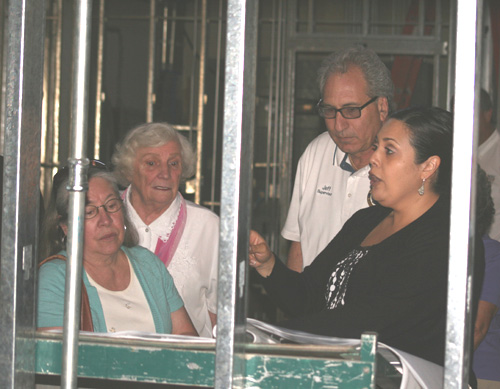In the past two weeks, Gov. Gavin Newsom has signed dozens of bills, which the Legislature sent him for approval. One will affect us at the grocery store, one will affect students in K-12, and several are surprising.
Plastic bags
The distribution of plastic bags for carrying groceries at checkouts will be banned. Our choice of “plastic or paper” bags will stop starting Jan. 1, 2026.
Senator Catherine Blakespear (D-Encinitas) and Assemblymember Rebecca Bauer-Kahan (D-Orinda) were the co-authors of Senate Bill 1053.
“I thank Governor Newsom for signing this important legislation that will help protect California’s environment,” said Blakespear. “Instead of being asked do you want paper or plastic at checkout, consumers will simply be asked if they want a paper bag, if they haven’t brought a reusable bag. This straightforward approach is easy to follow and will help dramatically reduce plastic bag pollution.”
Current law prohibits the use of a single-use carryout bag for a customer’s purchases at the point of sale. Many of these bags are neither reused nor recycled, contributing to increasing amounts of plastic waste in California’s landfills and oceans.
SB 1053 defines a carryout bag as made from paper or plastic and, importantly, is not made of recycled paper. “The bill would revise the definition of ‘recycled paper bag’ to require it be made from a minimum of 50% postconsumer recycled materials.”
“Plastic bags create pollution in our environment and break into microplastics that contaminate our drinking water and threaten our health,” said CALPIRG State Director Jenn Engstrom in Bauer-Kahan’s press release touting signing of SB 1053. “Californians voted to ban plastic grocery bags in our state almost a decade ago, but the law clearly needed a redo. With the Governor’s signature, California has finally banned plastic bags in grocery checkout lanes once and for all.”
“The legislation is aimed at closing a loophole in California’s ban of single-use plastic bags at grocery store checkouts, which was first passed in 2014 and then approved by the state’s voters in 2016. It allowed stores to provide consumers with thicker plastic bags at checkout,” Sen. Blakespear said in her press release. But customers were more likely to toss these bags in the trash rather than reuse them.
“The reality is that the thicker bags are difficult to recycle – and few are ever recycled – and they are seldom reused. Instead, they have contributed to California’s growing plastic waste.”
Further action on plastics
On Sept. 23 a day after Newsom signed SB 1053, California Attorney General Rob Bonta announced a lawsuit against ExxonMobil.
“For decades, ExxonMobil has been deceiving the public to convince us that plastic recycling could solve the plastic waste and pollution crisis when they clearly knew this wasn’t possible,” Bonta said in the Department of Justice press release. “ExxonMobil lied to further its record-breaking profits at the expense of our planet and possibly jeopardizing our health.”
The lawsuit claims ExxonMobil has mislead the public in a decades-long campaign of deception about the global plastics pollution crisis. The company repeatedly promised that recycling would address the growing use of plastic waste ExxonMobil produces.
ExxonMobil is the world’s largest producer of polymers used to make single-use plastics. These materials are produced by ExxonMobil from fossil fuels and are then molded (by other companies) into single-use plastic. For decades, ExxonMobil falsely claimed all plastic as recyclable, when in fact the vast majority of plastic products are not and likely cannot be recycled, either technically or economically, according to the California DOJ.
The States investigation into this issue began on April 28, 2022.
School smartphone use
On Sept. 23, Newsom signed Assembly Bill 3216, the “Phone-Free Schools Act”. The Act requires every school district, charter school and county office of education to adopt a policy limiting or prohibiting the use of smartphones by July 1, 2026.
“We know that excessive smartphone use increases anxiety, depression, and other mental health issues – but we have the power to intervene,” Newsom said in the press release announcing his signing of the Bill. “This new law will help students focus on academics, social development, and the world in front of them, not their screens, when they’re in school.”
AB 3216 requires the governing body of a school district, a county office of education, or a charter school to develop and adopt a policy to limit or prohibit pupils using smartphones while at a school site. This policy must be adopted by July 1, 2026.
There are some exceptions, such as an emergency, or in response to a perceived threat of danger. A physician may determine that possession of a smartphone is necessary for the student’s health.
“Research continues to demonstrate the potential harms of smartphone use among children. The growing use of these devices in a child’s everyday life can contribute to lower test scores, anxiety, depression, and even suicide, said Assemblyman Josh Hoover (R Folsom) co-sponsor of the legislation. “I am proud our state is taking action to limit the use of smartphones during the school day and protect kids from these harms.”
Concern over student use of smartphones during school became a visible national issue in June, when Surgeon General Vivek H. Murthy wrote a New York Times opinion piece warning of the use of cellphones and their connection to social media.
As schools began the current school year, Newsom wrote to State school districts and stressed, “Leveraging the tools of this law, I urge every school district to act now to restrict smartphone use on campus as we begin the new academic year. The evidence is clear: reducing phone use in class leads to improved concentration, better academic outcomes, and enhanced social interactions.”
In conjunction with Newsom’s August letter, State Superintendent of Public Instruction Tony Thurmond also wrote California school districts imploring them to address the issue to restrict students’ cell phone use in schools,
Locally, Hemet Unified School District has adopted a new policy regarding student cellphone use. It was implemented at the beginning of this new school year.
“We have adopted a district wide policy . . . that will limit the use of cell phones during instructional periods,” wrote HUSD Superintendent Dr. Christi Barrett in an email to the Town Crier. “The restrictions vary for elementary students versus middle school students, and high school students.”
New State symbols
On Friday, Sept. 27, Newsom also signed several bills establishing new state symbols, such as the California bear or the Redwoods.
The new designated state crustacean is the Dungeness crab. The black abalone is now honored as the state seashell; while the banana slug is the state slug.
“California has some of the most biodiverse environments in the world – with over 5,500 plants, animals, and other life forms. From the majestic California redwood down to the delicate California quail, every organism matters here – and it’s time we celebrated our less cuddly friends before they get too crabby,” Newsom said in the press release announcing these designations. “The Dungeness crab, the banana slug, and the black abalone each bring much to our state and are well deserving of this recognition.”
The legislators who took the initiative to honor these state inhabitants included Assemblymember Jim Wood (D-Healdsburg), who promoted the Dungeness crab (Metacarcinus magister).
Assemblymember Gail Pellerin (D-Santa Cruz) honored the banana slug (Ariolimax) for several reasons including its maximum speed of six and a half inches per minute.
Assemblymember Diane Dixon (R-Newport Beach) brought attention to the black abalone (Haliotis cracherodii) for a major role it played many coastal California Native American tribes’ lives. Today, the mollusks that these shells come from — once-common mollusks — are now endangered.





